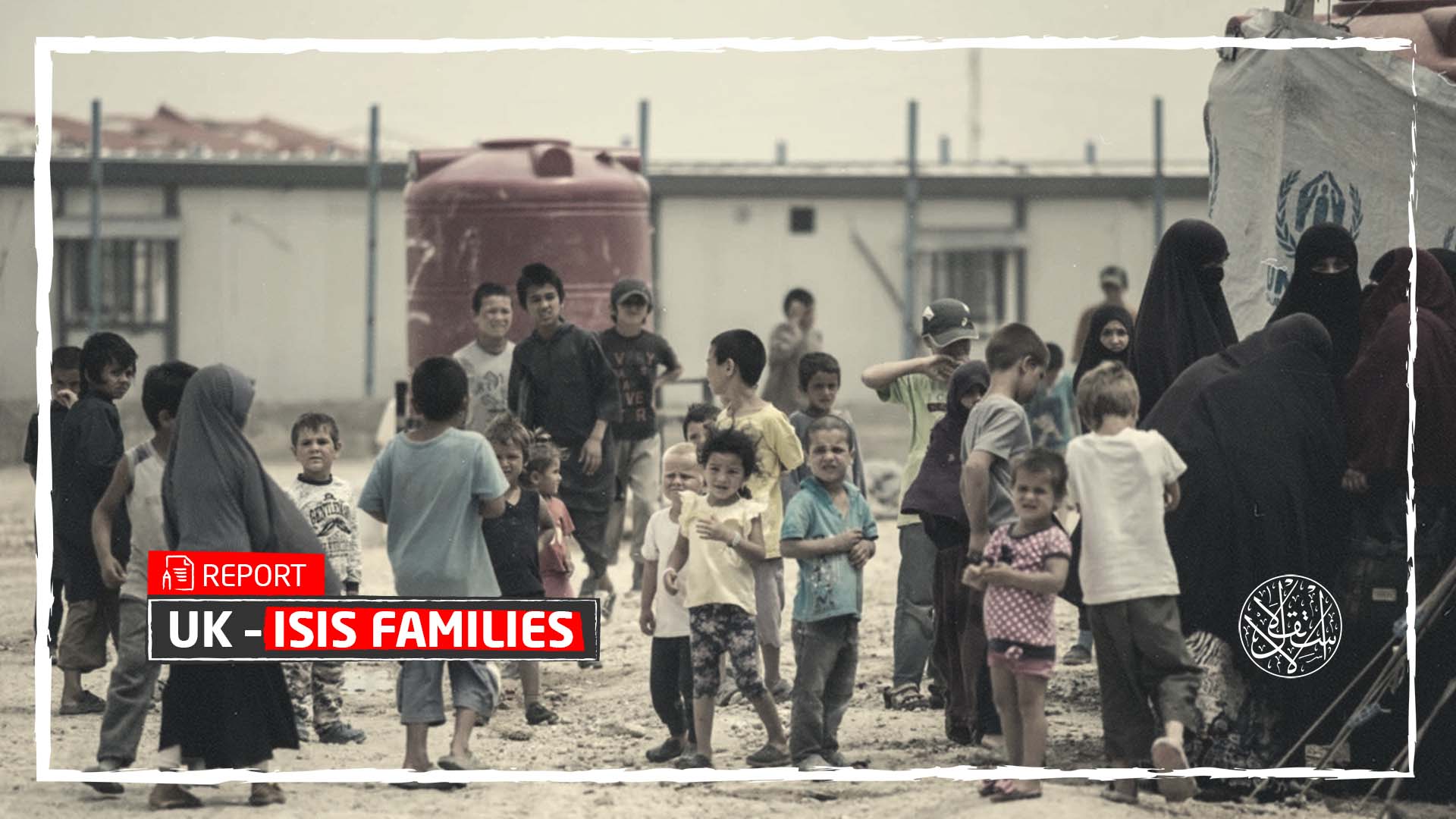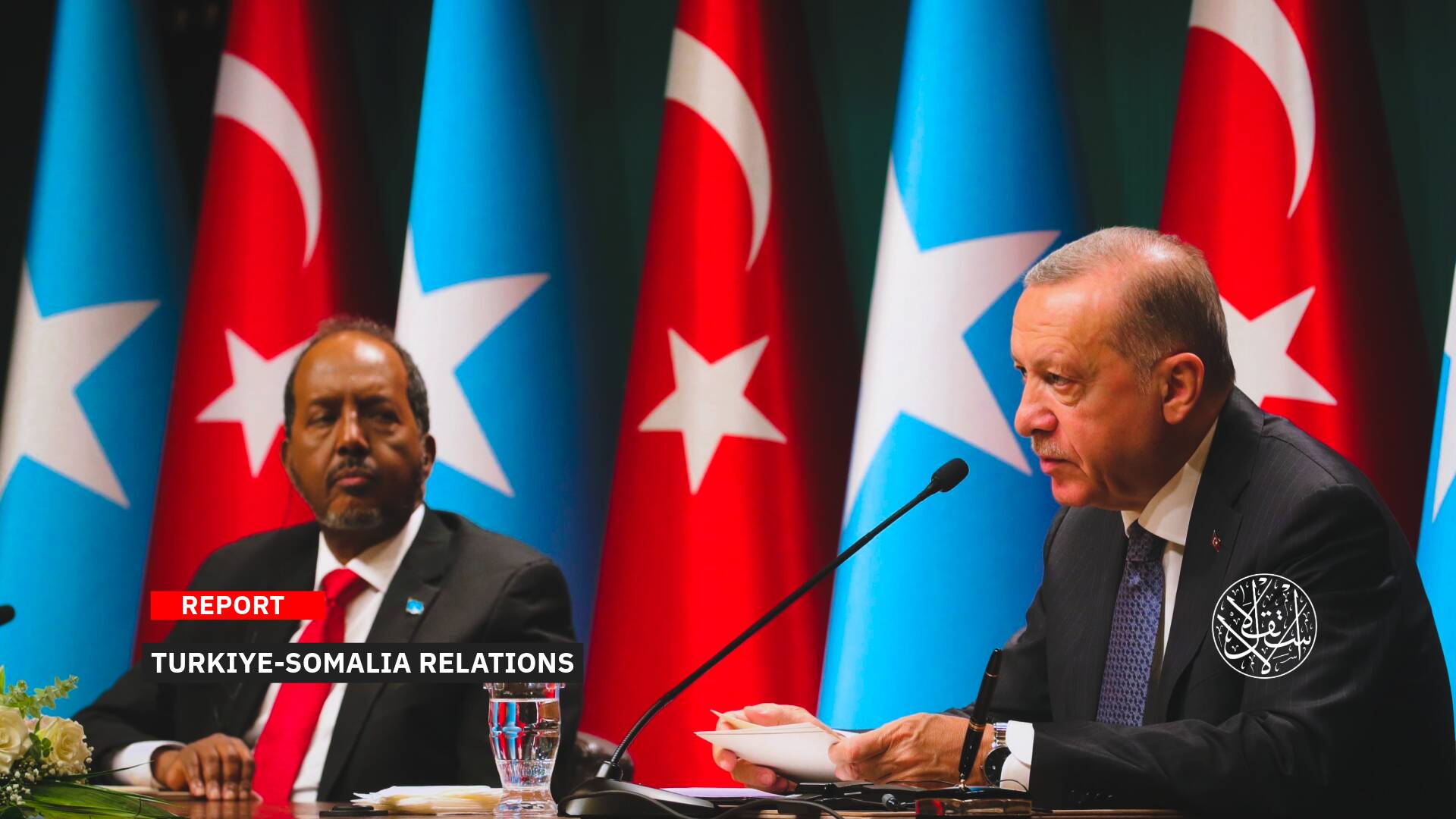Discriminatory Policy: This Is How the British Government Abandoned Protecting Its Citizens From ISIS Exploitation

A report prepared by the British Council All Party Parliamentary Group (APPG) and published by the Guardian newspaper on February 10, 2022 revealed compelling evidence concerning ISIS trafficking in British women and children and forcibly transferring them to Syria, amid a systematic failure by the British authorities, which represents a long-term security risk to the country.
The parliamentary report highlights missed opportunities to protect vulnerable people who were later stripped of their British citizenship and are currently held in camps in northeastern Syria.
After a six-month parliamentary investigation into Britons trafficked into Syria by ISIS, the report explained how systematic failures by public bodies in the UK enabled the terrorist group ISIS to traffic women and children at a young age.
The report indicated that about 20 British families (50 people) are still being held in northeastern Syria in camps controlled by Kurdish groups backed by the United States.
The parliamentary report also found that the British government refused to provide basic consular assistance and made no effort to determine whether British women and children in detention camps in northeastern Syria are victims of trafficking.
Instead, the British government implemented a policy of mass stripping of citizenship, on the grounds that women travel to Syria of their own volition.
The committee heard directly from families of those currently detained in Syria about the devastating and discriminatory effects of these policies on their sense of security and belonging within the UK.
The report stated that many family members of detainees in Syria reported that they felt like second-class citizens as a result of the government's response.
The report concluded that the British government had failed to meet its obligations to identify, investigate and protect potential trafficking victims.

The Guardian also warned of the UK's refusal to repatriate British families, exacerbating the risk of human trafficking, by forcing women to think of other ways to escape the camps, and risking their lives and the lives of their children and placing them in the hands of smugglers may expose them to further exploitation.
In turn, Conservative MP Andrew Mitchell said: “The government’s approach to British nationals detained in Syria is morally reprehensible, legally dubious and utterly negligent from a security perspective.”
“The United States has asked us to bring British families home. Our European allies have shown us how. Ministers who remain committed to the current failed policy would do well to read this report outlining the potentially catastrophic consequences of their continued inaction,” Mitchell added.
Baroness Saeeda Warsi, Vice-President of the APPG, also condemned the government's refusal to repatriate British families and strip them of their citizenship.
Warsi revealed that “the government has used its powers to deprive Muslims of citizenship almost exclusively, and is now seeking to extend these strict powers,” noting that the government believes that Britons from minority communities can easily take away their rights.
In contrast, the newspaper quoted a government spokesperson as saying: “Our priority is to ensure the safety and security of the UK, those who remain in the conflict zone include some of the most dangerous individuals, and it is they who have chosen to remain to fight or support ISIS.”

Victims of Exploitation
The APPG's findings are consistent with an investigation conducted by the human rights NGO Reprieve last April, which concluded that nearly two-thirds of British women and children held in camps in northeastern Syria are victims of human trafficking.
The organization's investigation accused the British government of systematically abandoning its nationals by depriving them of British citizenship, refusing to return families, and not providing them with consular assistance.
It also indicates that most of the detained British women (some of them as young as 12 years old) are victims of trafficking and other forms of exploitation, including sexual exploitation, they were either taken as children to Syria, forced to go there, or detained and internally displaced against their will.
The investigation highlighted many missed opportunities to protect vulnerable women and children from ISIS.
In one case, the newspaper says, the UK authorities initially prevented a girl from leaving the country with an adult who is not a relative.
“The authorities did not inform the girl's family of the incident, as the girl left the UK in a different way the next day,” according to the Guardian.
The girl's family believes that if the authorities had contacted them at that time, they might have been able to prevent the adult from transferring their girl to Syria.

On his part, Jeffrey DiLaurentis, Senior Adviser for US Special Political Affairs, said in a briefing to the UN Security Council on the threat posed by ISIS in the region on February 09: “The number of foreign nationals in ISIS camps in Syria has reached 40,000.”
Last year, Human Rights Watch said that an estimated 12,000 children and women, who were not originally from Iraq or Syria, are now living in detention camps for family members of ISIS fighters.
In 2021, at least 163 people died in the notorious al-Hol camp in northeastern Syria, 62 of whom were children. Reports also indicate that two children die in al-Hol and Roj camps every week, due to preventable diseases.
Human rights groups are constantly calling on Western countries to repatriate their citizens, who live in difficult humanitarian conditions in these camps, especially children and women, since the fall of the caliphate was announced in March 2019.
In turn, the Secretary-General of the Syrian Council for Change, lawyer Mr. Hassan Alaswad, says in a statement to Al-Estiklal that “several countries refused to repatriate their nationals who joined ISIS, with some even claiming that they had no legal obligations to provide assistance.”
“Most of the children face the same indefinite detentions as their parents, and the detention camp conditions are appalling and dangerous. They will undoubtedly be affected by the environment in which they live, which is fertile ground for extremism and the next generation of ISIS followers,” he continues.
“These children will have no chance of returning to normal life over time, they will always be branded as terrorists, and some of them may actually turn into terrorists if they are not properly rehabilitated,” Mr. Alaswad adds.

Malicious Discriminatory Policy
As for the direct and indirect reasons for the failure of the British authorities to prevent ISIS from exploiting British women and children, international lawyer and researcher Mr. Bassam Tablieh believes in a statement to Al-Estiklal that “Western countries, led by the United States, are the ones who unleashed the jihadist ideology to leave the country voluntarily and head to Syria, and that was part of a plan called the Hornets’ Nest.”
“Therefore, it was easy for those jihadists to travel to Syria, and there was a disregard for their travel, then we heard later that many jihadists had been assassinated in Syria, and a large part of them were British nationals; this means that there is a real tacit desire on the part of the British government to get rid of these people,” he adds.
From a different point of view, lawyer Mr. Hassan Alaswad sees that “it is not possible to enumerate the reasons related to the inability of the British authorities to monitor the departure movement of those targeted by terrorist organizations, for example: There is no real control in British airports for departures from British passport holders, and Europeans in general before Brexit, and this is a primary reason and may be influential.”
“There is another reason related to the nature of the democratic countries themselves, in these countries, there are many controls imposed on law enforcement agencies that limit their freedom of movement, such as wiretapping, tracking, and others. Laws protecting individual liberties and data protection often hinder the work of government agencies, and sometimes even disrupt the work of intelligence services,” he points out.
“Another reason lies in the marginalization experienced by young people in general, this situation is not intentional, but it is a disease of modern capitalist societies, which creates in these groups a greater willingness to break out of the norm and to try strange works,” Mr. Alaswad added.

Rights organizations believe that the only way to reduce the potential threat from British nationals in their detention centers in Syria is to repatriate them, prosecute them, or reintegrate them into society, and work within the framework of the rule of law.
With regard to the reasons for the British government's refusal to repatriate these families, Mr. Alaswad points out that “there is a great risk that returning these citizens after they have lived with very extremist people for long periods, and after some of them have engaged in terrorist criminal acts, can pose a significant risk.”
“The police and intelligence services will have to allocate entire units to monitor these people around the clock, in addition to examining their records to ascertain whether they have in fact committed grave acts punishable under British law or war wounds, these things have huge financial costs,” he adds.
“It is well known that criminal responsibility is an individual one, and judicial standards prevailing in Britain are very high; this means that they cannot be convicted and imprisoned in British prisons without fair trials, as the costs of rehabilitating them for their reintegration into British society are very expensive, and the results are not guaranteed in return,” Mr. Alaswad continues.
In the same context, international lawyer Mr. Bassam Tablieh said: “After largely eliminating ISIS, we find that the British government refuses to take back its nationals who were in ISIS-controlled areas and are currently detained in camps in eastern Syria, this matches previous British plans to get rid of these people.”
“Everyone knows that the process of entering the judiciary is very expensive for the British government, which usually pays the expenses of lawyers and lawsuits, not to mention that many of these claims the government has failed to prove, which led, for example, to the conclusion of secret settlements with the jihadist parties and the payment of compensation to them at the expense of taxpayers; so there is an implicit reluctance for these families to return to the UK,” Mr. Tablieh noted.










